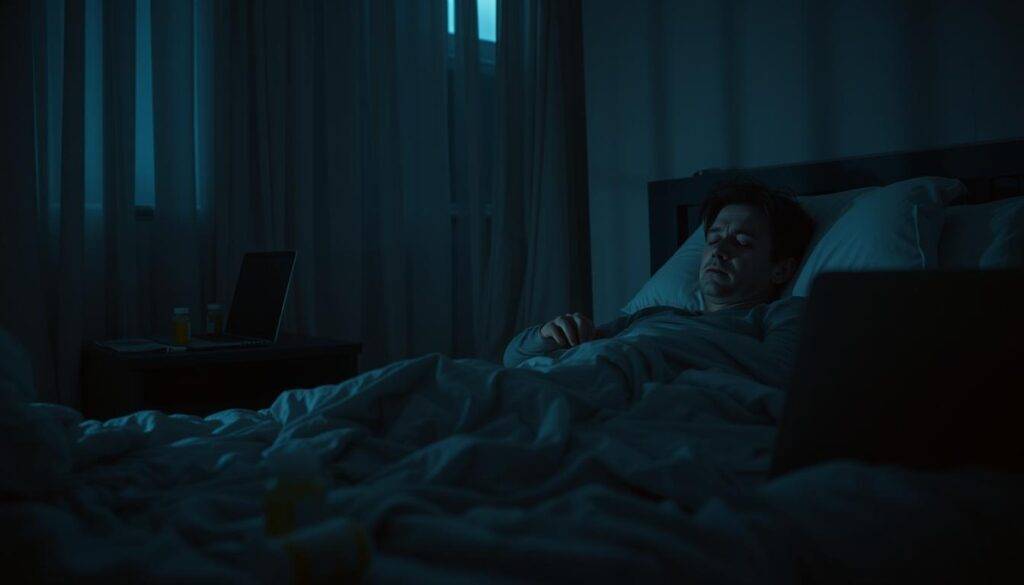Do you find yourself lying awake at night, unable to sleep? You’re not alone. Millions of people suffer from insomnia, making it hard to live a normal life. To beat insomnia, you need to know what causes it. This includes triggers and factors that keep you awake.
Insomnia is serious if it lasts for three months or more. Most adults need seven to nine hours of sleep each night. Yet, many can’t get enough rest. About 30% of adults have short-term insomnia, while 10% have chronic insomnia. Knowing what causes it is key to finding a cure.
Understanding the Impact of Insomnia
Insomnia can really mess up your life. It can lead to health problems and make you less productive. To get better sleep, you must tackle the root causes of insomnia. By doing so, you can improve your sleep and live a better life.
Key Takeaways
- Insomnia is a common sleep disorder that affects millions of people
- Understanding the causes of chronic insomnia, including insomnia triggers and underlying factors of sleeplessness, is crucial to developing effective treatment strategies
- Adults typically require seven to nine hours of sleep daily for optimal health and functioning
- Approximately 10% of adults suffer from chronic insomnia, which can significantly impact daily functioning
- Cognitive Behavioral Therapy (CBT) is recommended as the first-line treatment for insomnia
- Identifying and addressing underlying factors of sleeplessness and insomnia triggers is essential to improving sleep quality
Understanding the Impact of Chronic Insomnia on Your Life
Chronic insomnia can deeply affect your life, touching your physical, mental, and emotional health. Reasons for long-term lack of sleep are complex, but knowing the causes and effects is key. Effective meditation techniques can boost sleep quality. Yet, it’s vital to grasp the underlying factors of insomnia.
Factors like irregular sleep, lack of exercise, and caffeine can lead to sleep deprivation origins. Also, chronic sleep issues causes can stem from health problems like anxiety, depression, and chronic pain. Identifying insomnia’s root causes helps you tackle it and enhance your health.
Here are some key statistics on insomnia’s impact:
- People with insomnia are five times more likely to develop depression
- Adults sleeping less than 8 hours a night often feel more stressed
- Not getting enough sleep can cause weight gain and increase diabetes risk

Understanding insomnia’s effects on your life is the first step to addressing it. It’s a crucial move towards better health and well-being.
Common Causes of Chronic Insomnia You Need to Know
Exploring sleep disorders, it’s key to know the insomnia root causes that mess with your sleep. About 30% of adults face insomnia symptoms at some point. Around 10% deal with chronic insomnia, which means they can’t sleep well for three months or more.
Many lifestyle habits, health issues, and stress can lead to insomnia. For example, irregular sleep times, too much caffeine, and ongoing pain can cause it. Hormonal problems, breathing issues, and mental health like anxiety and depression also affect sleep.
Spotting the underlying factors of sleeplessness is vital for a good treatment plan. This might mean fixing health issues, using relaxation methods, and sticking to a sleep schedule. Knowing what causes chronic insomnia helps you fight it and sleep better.

- Women are 1.5 to 2 times more likely to experience insomnia than men.
- Insomnia is linked to a 40% higher risk of anxiety disorders.
- 50% of those with insomnia also have depression symptoms.
By recognizing these factors and getting help, you can beat chronic insomnia and get a good night’s sleep.
The Hidden Role of Stress and Anxiety in Sleep Disruption
Stress and anxiety are big insomnia triggers that mess with your sleep. They can lead to reasons for long-term lack of sleep and sleep deprivation origins. Stress hormones like cortisol make it hard to sleep well. This creates a cycle of anxiety and insomnia, making it tough to get a good night’s sleep.
To stop this cycle, find out what stresses you and learn to manage it. Try relaxation techniques like deep breathing or meditation. Exercise, like yoga or walking, can also lower stress and anxiety.
Also, keep a regular sleep schedule and make bedtime relaxing. Make your bedroom cool, dark, and quiet. Avoid caffeine and nicotine before bed. By tackling stress and anxiety, you can start to overcome insomnia triggers and sleep better.
Some good ways to manage stress for better sleep include:
- Practicing relaxation techniques, such as deep breathing or progressive muscle relaxation
- Engaging in regular exercise, such as yoga or walking
- Establishing a consistent sleep schedule and bedtime routine
- Creating a relaxing sleep environment, such as keeping your bedroom cool, dark, and quiet
Lifestyle Habits That May Be Keeping You Awake
Looking into your lifestyle habits is key to tackling causes of chronic insomnia. Things like irregular sleep times, too much caffeine, and not enough exercise can lead to insomnia root causes. Knowing how these habits impact your sleep is the first step to a better sleep routine.
Some habits that might mess with your sleep include eating big meals before bed, doing stimulating activities before sleep, and using screens too close to bedtime. To fight persistent insomnia factors, try changing your daily routine. Avoid caffeine 6 hours before bed, exercise regularly, and relax before sleep.
By tweaking these habits, you can sleep better and cut down on insomnia. It’s all about making your sleep space better and adopting habits that help you rest well.
- Establish a consistent sleep schedule
- Avoid caffeine and electronics before bedtime
- Engage in regular physical activity
- Practice relaxation techniques before sleep
Medical Conditions Behind Your Sleepless Nights
Exploring the reasons for sleeplessness is key. Many medical conditions can lead to insomnia. It’s important to know how these conditions affect your sleep.
Here are some common medical conditions that can disrupt sleep:
- Chronic pain: It can be hard to relax in bed, causing insomnia.
- Hormonal imbalances: Changes in hormones, like during menopause or pregnancy, can lead to night sweats and hot flashes.
- Respiratory issues: Sleep apnea can wake you up many times a night, even if you don’t remember it.
To beat insomnia, you must tackle these medical issues. Understanding the causes of sleeplessness is a big step towards better sleep. Remember, insomnia might signal a deeper health problem. So, seeing a doctor is crucial to find the right treatment.
The Connection Between Diet and Chronic Insomnia
Diet plays a big role in sleep problems. Eating too much of refined carbs, like added sugars and processed grains, can lead to causes of chronic insomnia. But, eating whole foods like fruits, veggies, and whole grains can help prevent insomnia.
Studies show that eating foods like whole grains, nuts, and low-fat dairy can lower insomnia root causes risk. But, a diet full of refined carbs, like added sugars, can increase insomnia risk. The exact reason is not clear, but it might be because of how blood sugar levels spike and drop.
To sleep better, eat whole, unprocessed foods. Avoid big meals before bed, cut down on caffeine and sugar, and eat foods that help you sleep, like tryptophan-rich foods. Making smart food choices can help fight insomnia and improve sleep overall.
Environmental Factors Disrupting Your Sleep Patterns
Exploring sleep deprivation origins and chronic sleep issues causes shows the big role of the environment. Things like noise, light, and temperature can really mess with your sleep. These elements are key insomnia root causes.
Studies reveal that living in tough neighborhoods can cut your sleep short by 7-11 minutes. Also, a better neighborhood environment means sleeping 9 minutes more on average. This shows how important a good sleep space is to fight chronic sleep issues causes.
To make your bedroom sleep-friendly, try earplugs, blackout curtains, and a white noise machine. Keeping your bedroom cool is also key for better sleep. Tackling these environmental issues can help you sleep better and avoid insomnia root causes.
Changing your environment a bit can help fight sleep deprivation origins and chronic sleep issues causes. A well-made sleep space is vital for a good night’s sleep. It’s a big part of solving insomnia root causes.
Creating Your Personalized Sleep-Promoting Routine
To beat chronic insomnia, you must know what keeps you awake. Create a sleep routine that fits you. This way, you’ll sleep better and wake up feeling great.
Keeping a regular sleep schedule is key. Stick to a bedtime routine and make your bedroom sleep-friendly. A cool, dark, quiet room with a comfy mattress and pillows helps a lot.
Relaxation Techniques for Better Sleep
Try deep breathing, meditation, or yoga to calm down before bed. Exercise is good, but not too close to bedtime. A warm bath or chamomile tea can also relax you.
Understanding insomnia’s causes is the first step. Avoid bright lights and heavy meals before bed. Create a soothing bedtime routine. With effort, you can beat insomnia and sleep well.
- Avoiding caffeine and nicotine close to bedtime
- Avoiding heavy meals close to bedtime
- Creating a relaxing bedtime routine
- Optimizing the bedroom environment
- Getting regular physical activity
Use these tips to sleep better. It’s important to tackle the root causes of insomnia. This way, you can make a sleep routine that really works for you.
Professional Treatment Options Worth Exploring
When facing insomnia root causes, professional help is key. Cognitive Behavioral Therapy (CBT) is a top choice. It tackles the underlying factors of sleeplessness head-on, not just the symptoms.
This therapy changes how you think, feel, and act towards sleep. It leads to lasting improvements. A sleep diary might be suggested to track your sleep patterns.
Most people need 6 to 8 CBT sessions. Unlike pills, CBT offers lasting benefits without side effects. It’s vital to find a skilled healthcare professional to guide you.
Other treatments include stimulus control, sleep restriction, and relaxation therapy. These methods help tackle persistent insomnia factors and boost sleep quality. It’s important to work with a healthcare expert to find the right treatment for you.
Professional treatments offer many benefits:
- They address the root causes of insomnia
- They improve sleep quality and length
- They lower the risk of health problems linked to insomnia
- They enhance overall well-being and life quality
Exploring professional treatments and consulting with a healthcare professional can help you beat insomnia root causes. Prioritize your sleep health and seek help when needed.
Conclusion: Your Journey to Restful Sleep Starts Now
Your journey to beat chronic insomnia is important. By knowing the causes and triggers, and using effective strategies, you can get the sleep you need. Remember, many Americans face sleep problems, so you’re not alone.
Getting better sleep might seem hard, but it’s possible with the right mindset and steps. If you need help, don’t hesitate to seek professional advice. Try treatments like cognitive-behavioral therapy and light therapy to find what works for you.
Your journey to better sleep begins today. Make lifestyle changes, tackle the causes of chronic insomnia, and face insomnia triggers head-on. With the right support, you can overcome sleep issues and enjoy the benefits of quality sleep. Take back your energy, focus, and well-being – better sleep is within your reach.
FAQ
What are the common causes of chronic insomnia?
Lifestyle habits like irregular sleep schedules and too much caffeine can cause chronic insomnia. Medical conditions like chronic pain, hormonal imbalances, and breathing problems also play a role.
How does chronic insomnia affect physical and mental health?
Chronic insomnia can lead to diseases like diabetes and heart disease. It also harms mental health, increasing the risk of depression and anxiety.
What is the link between stress, anxiety, and chronic insomnia?
Stress and anxiety can disrupt sleep by triggering the body’s stress response. This makes it hard to fall and stay asleep. Breaking this cycle is crucial for overcoming insomnia.
How can lifestyle habits affect sleep quality?
Irregular sleep schedules, too much caffeine, and not enough exercise can disrupt sleep. These habits make it harder to fall and stay asleep.
What medical conditions can cause chronic insomnia?
Conditions like chronic pain, hormonal imbalances, and breathing problems can cause insomnia. They interfere with the body’s ability to sleep well.
How can diet influence sleep quality?
What you eat can affect your sleep. Some foods help sleep, while others can trigger insomnia. Eating sleep-promoting foods and avoiding triggers can improve sleep.
What environmental factors can disrupt sleep patterns?
Noise, light, and temperature can greatly affect sleep quality. It’s important to make your bedroom a sleep-friendly environment.
What are some professional treatment options for chronic insomnia?
Professional treatments include cognitive behavioral therapy and medication. These can help individuals overcome sleep challenges and improve their sleep quality.




























































